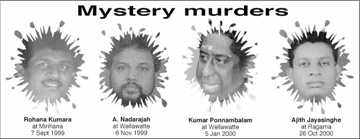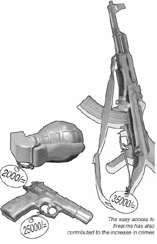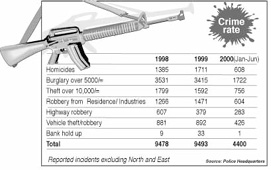The Special Report 1
26th November 2000What a crime
Police-banks tie up to check robbers
News/Comment|
Plus| Business| Sports|
Sports Plus| Mirror Magazine

What a crime
By Christopher Kamalendran, Chandani Kirinde and Tania Fernando

Sri Lanka is fast becoming a killing field with people losing faith in both the law enforcers and the judicial system
Sri Lanka is fast moving towards staking the no- torious claim to fame of being called a leading crime capital of the world with murders, rape, bank robberies, theft and vigilante killings becoming an everyday occurrence.
With many fingers pointing at the failure of the law enforcers to even carry out their basic duties, the law of the jungle is fast taking precedence over the law of the land.
An outdated penal code coupled with delays in litigation has compounded the crime problem with people fast losing faith in both the law enforcers as well as the judicial system and taking the law unto their hands.
In the past month, there have been more than 25 killings and 20 robberies reported from various areas in the country. A startling fact that has been revealed in recent studies on crime in Sri Lanka is that over 90 per cent of those involved in these activities were below the ages of 25 years.
SSP Gamini Seneviratne of the Colombo Detective Bureau (CDB) said the main reasons for the increase in crime were political interference, unemployment and poverty.
He said the police were being distracted from their routine law enforcement duties by being detailed for various other duties such as VIP security and road blocks.
"There is no way of totally eliminating crime but we can do more to minimise the incidents," SSP Seneviratne said.
Sociologists have also identified rampant youth unemployment, the growing gulf between the rich and poor and a breakdown in acceptable norms in accumulating wealth as reasons for this spiralling menace.
According to Prof. S. T. Hettige of the Sociology Department of the
University of Colombo, in the present economic scenario one has a tendency
to make money at whatever cost. "There is a kind of anarchy in the system
of distribution and the acquisition of wealth. People want to amass wealth
without going through the acceptable methods".
Army and police deserters numbering to around 35,000 are mainly being blamed for the rapid rise in crimes. Easy access to firearms has also contributed to the increase in crimes with many falling prey to the temptations of making a quick buck in the absence of any deterrent against such crimes.
Personal disputes have also turned bloody these days. On November 13, a lover's row in Kirindiwela lead to the scorned lover throwing a hand grenade into the home of his girl friend while the family sat watching television killing the girl's father and seriously injuring two others.
The following day, five people were shot dead in Devinuwara. All five were accused in a homicide case and were travelling to court when they were killed.
The following day, a 28 year old youth was stabbed to death in the Kochchikade area over a personal dispute.
In all cases, the Police have made little headway in the investigations although one person has been arrested in connection with the Devinuwara shooting.
The other reported cases of violence this month included the shooting of the security officer of the Speaker Ajith Jayasinghe near his home in Ragama, the killing of the Principal of the Mahasena Vidyalaya in Medawachchiya and the grenade attack on the residence of the unofficial magistrate of Negombo.
Some of the prominent murder cases that remain unresolved till today include the shootings of Satana editor Rohana Kumara, All Ceylon Tamil Congress (ACTC) leader Kumar Ponnambalam, EPDP MP and Thinamurusu editor A.Nadarajah.
Other crimes included a leading private bank in Negombo being robbed after a hold up by a gunman which was followed by a string of robberies of salary monies from private companies in Kadawatha, Maradana and Madampitiya amounting to over four million rupees on a single day.
A senior Police officer who wished to remain anonymous blamed the inefficiency of the Police as the main reason for the rise in crimes.
"The laws dealing with crimes are formidable but failure on the part of the police to arrest, investigate and prosecute the offenders has made the criminals complacent. The prime responsibility of the police is to maintain law and order, but unfortunately the department is entangled in a web of corruption and abuses", he said.
The officer said that while millions of public funds is utilized for the upkeep of the police service in the form of welfare facilities, vehicles, and numerous other benefits, the department is doing a great dis-service to the public. Effective policing is needed to maintain law and order, but serious lapses on their part are affecting the day to day lives of the people.
He said the aspect of prosecution of criminals is being paid scant respect by the Police with lethargy towards investigation and getting criminals convicted.
He added that statistics fail to reveal the true picture of the extent of criminal activities in the country as certain officers in charge of police stations change figures to show their areas as crime free.
Not everyone sees the inefficiency of the Police Department as the main reason for the rise in crimes.
According to Attorney-at-law and Commissioner of the Law Commission Jayatissa De Costa, the attitude of society towards criminals itself is to blame for this problem.
"In our country, criminals are easily accepted back into society and not made to feel they have done something wrong.So they conveniently go back to committing the same crimes after serving a short jail sentence or paying a fine," he said.
The present penal Code was enacted in 1883 and except for a few amendments brought in over the years, it is grossly insufficient to deal with the magnitude of multifanged crimes being committed today.
Dr. De Costa said the Penal Code needed to be re-enacted and the legal aid system improved to increase efficiency in the judicial system.
 The
inaccessibility and unfriendly attitude of the Police towards the very
public, who pay for their upkeep, has also led to members of the public
losing faith in the law enforcers themselves.
The
inaccessibility and unfriendly attitude of the Police towards the very
public, who pay for their upkeep, has also led to members of the public
losing faith in the law enforcers themselves.
The time spent at a police station on an average by a member of the public to record a complaint can range from an hour to several hours. Although legally any police constable is empowered to takedown a statement of a complainant, on most occasions they are made to wait till a particular officer turns up.
Many of the cases that have been successfully prosecuted by the Police in recent times have been the ones that have received a lot of prominence in the media which include the gruesome killings of five members of one family in Hokandara, the kidnapping and murder of seven year old school boy Sadeepa Lakshan and the rape and murder of Rita John.
The trial-at - bar hearing into another much publicized case involving the murder of woman soldier Inoka Sewwandi is also underway.
However in less prominent cases which receive little attention in the mass media, the victims are soon forgotten and families are left with little hope for justice.
For most of the families who live through the experience of a violent crime, the trauma lives with them throughout their lives but there is little hope of ever seeing justice done.
Police-banks tie up to check robbers
All banks have been directed to take tough new security measures to curb the spate of robberies. Senior Deputy Inspector General T. Anandarajah who met top executives of state and private banks said he advised them to get highly-trained security officers and modernsie their security systems while police would conduct more patrols around banks. The move came after a series of bank hold-ups and a robberies of pay rolls amidst an escalating crime rate. The ruling PA's executive committee at a meeting on Wednesday recommended that the death penalty — not carried out since 1976 — be executed again while tough new laws are introduced to check crime. The new Justice Minister Batty Weerakoon, however, told The Sunday Times he believed that unprofessionalism in the police was also contributing towards the rising crime rate. Police lack independence, says Batty Batty Weerakoon, the newly appointed Justice Minister blamed un-professionalism on the part of the Police force and political interference for the rise in violent crime in the country and said the setting up of an Independent Police Commission would do little to remedy the situation. In a brief interview with The Sunday Times, Mr. Weerakoon said although the existing laws were adequate to meet the challenges ,he was contemplating certain amendments to the criminal procedure code which would expedite cases in magistrates courts and non summary proceedings so that offenders could be indicted in the High Court within a short period. He said steps would also be taken to restrict bail so that people involved in organized crimes will not benefit from the existing bail laws. "There has to be a revamp of the police service too. The police has lost its professionalism over the years due to political interference which came by way of patronage extended by Members of Parliament," he said. Mr. Weerakoon said the first step to free the police from this situation is to insist that the transfer of police personnel from various areas and disciplinary action be taken in strict accordance with the rules of the service and the police department left free to attend to such matters. "I do not see that an establishment of an independent police system will prevent the misuse of the police by political authorities. The police force lack independence. In a democracy the police have to be responsible to the government in power and the government in turn accountable to Parliament" the Minister pointed out. "The so called independent police commission will give excuse to the politicians not to be accountable to parliament, whilst at the same time they use the leverage of power to misuse the police." The Minister added that the establishment of such a commission would prevent an MP from seeking explanation from the police for an offensive action in an adjournment question, thus leaving room for the Police to be a law unto themselves.







![]()
Front Page| News/Comment| Editorial/Opinion| Plus| Business| Sports| Sports Plus| Mirror Magazine
Please send your comments and suggestions on this web site to

